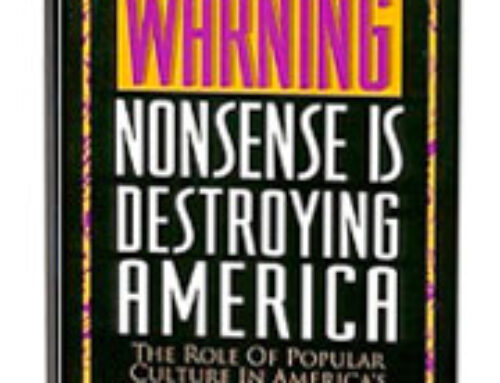 “Corruption” is a popular word today, and it is usually used to denote dishonest behavior within an institution. The most common example is politicians’ misuse of their offices for personal gain or violation of their oath to uphold the Constitution. Other examples are educators’ abandonment of academic standards and journalists’ substitution of personal opinion for objective fact.
“Corruption” is a popular word today, and it is usually used to denote dishonest behavior within an institution. The most common example is politicians’ misuse of their offices for personal gain or violation of their oath to uphold the Constitution. Other examples are educators’ abandonment of academic standards and journalists’ substitution of personal opinion for objective fact.
Such corruption is cause for concern. But a more dangerous type of corruption is the corruption of our culture—that is, abandonment of the fundamental ideas and ideals of our society. This more significant kind of corruption has been increasing in America for more than a century and causing the corruption of particular institutions.
Many analysts and commentators do a good job of examining corruption within one or more institutions—for example, politics, journalism, education, and law. Individuals such as Rush Limbaugh, Bill O’Reilly, Sean Hannity, Mark Levin, and Laura Ingraham come immediately to mind.
Few, however, address the corruption of culture itself. One reason for this failure, as analogists are fond of noting, is that culture is to humans as water is to fish—something in which they are completely immersed and therefore not fully aware of. Another reason is that corruption of thought patterns and attitudes is much more difficult to identify and analyze than corruption of outward behavior.
Why is it vital that the corruption of culture itself be examined and discussed? Because until that corruption is overcome, there is no chance of overcoming the corruption within individual institutions. In a very real sense, those lesser corruptions are merely symptoms of the corruption of our society’s fundamental ideas.
Indian social leader Mohandas (Mahatma) Gandhi offered this illuminating explanation of the power that beliefs have in our lives:
Beliefs become thoughts,
Thoughts become words,
Words become actions,
Actions become habits,
Habits become values,
Values become destiny.
What he did not say, but what I am certain he knew, is that beliefs do not just pop into our heads. They are formed in the context of our culture—the ideas and attitudes we encounter through teachers, mentors, and information sources. Intellectually lazy people tend to accept other people’s ideas unquestioningly. Curious, analytical people are inclined to evaluate ideas before accepting them. However, after hearing an idea repeated over and over, even they may lower their defenses and embrace it uncritically.
A more complete expression of Gandhi’s progression would be: the dominant ideas of our time become our beliefs, which become, in turn, our thoughts, words, actions, habits, values, and destiny.
The tragedy of our time is that the fundamentally sound ideas that comprise traditional American culture have been corrupted over the past century, and this corruption has wreaked havoc on virtually every American social institution, including the family, the church, education, journalism, entertainment, and government.
The corruption occurred in two stages. The first occurred in the first half of the 20th century through Hereditarianism. The main ideas of this movement were that intelligence is genetic, most people are seriously deficient in it, and nothing can be done by education or individual effort to overcome the deficit. This profoundly pessimistic notion was quickly and widely accepted as scientific truth and caused dramatic changes to be made in education, business, journalism, and government. The belief underlying all these changes was, “The masses must be treated like the incompetents they are and kept from ruining society.” (One favored approach was to prevent the most deficient from reproducing.)
The second stage of corruption occurred in the second half of the 20th century through Humanistic Psychology. This movement replaced Hereditarianism’s absurd pessimism with an equally absurd optimism, which held that people are so wise and wonderful that they can create their own truth and reality and thus have no need for guidance from parents, teachers, the clergy or, for that matter, God! Moreover, that they are deserving of everyone’s esteem, most of all their own.
It would be hard to imagine movements more in opposition to each other than Hereditarianism and Humanistic Psychology. Yet against all odds, they have managed to exist side by side and continue, each in its own way, the corruption of American culture.
One may wonder why society’s embrace of one of these views would not automatically take away the status of the opposing view. I’ll cite but one of many reasons. Hereditarianism caused the schools to abandon the idea of teaching students how to think in the belief that they were incapable of such learning. When Humanistic Psychology offered a radically optimistic view of human abilities, one might expect the schools to have taken a more favorable view of thinking instruction. Some individual teachers actually did so, but their efforts could not change the system because the courses, teaching methods, and testing instruments were all designed to serve rote learning rather than mindfulness. As a result, the mindless curriculum remained and exercises in self-esteem such as chanting, “I am talented, I am smart, I can accomplish anything,” were merely grafted onto it.
The lesson from Gandhi’s point noted above is that beliefs have consequences. And the consequences of the erroneous beliefs that Hereditarianism and Humanistic Psychology have embedded in our culture include the social problems that plague America.
As I explain in Corrupted Culture, the crucial first step in overcoming these social problems is to understand the myriad ways in which the erroneous beliefs have affected our thoughts, attitudes, and actions. That understanding is the key to restoring the principles, values, and common sense that have made America great.
Copyright © by Vincent Ryan Ruggiero. All rights reserved

